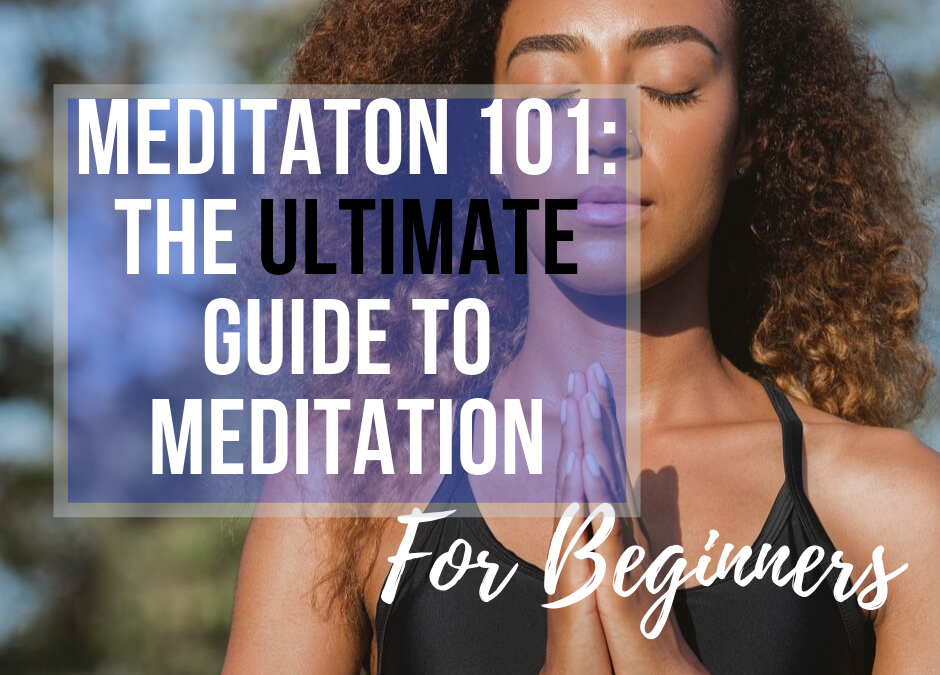As Doctors we write about evidence- based facts and with that in mind select products we believe to be the best for our readers. Thelifestylecure.com is a participant of the amazon associates program and we may earn a very small commission from qualifying purchases at no extra cost to you.
You’ve heard meditation is good for you right? Cindy told you it helps her to calm down after she locks herself in her bathroom to get away from her screaming kids or Mary who meditates to align her chakras?
Lots of people think its pretty cool but not many know much about mediation. Especially beyond what is depicted on tv shows, movies, Instagram, or other social media platforms.
Mediation isn’t just some sort of “hippy thing” you’ve heard people do at Woodstock or seen at Coachella.
Instead, mediation is a mind and body practice which has a long history of use for increasing calmness and physical relaxation. As well as improving psychological balance, coping with illness and enhancing overall health and well-being.
Basically, IT’S A GAME CHANGER!
In this post we are going to give you an overview of meditation for beginners. We will begin by looking at the history, the benefits, and end with the styles of meditation.
Ok, lets start!
Table of Contents
History of Meditation

History of Meditation
The exact origin of meditation is unknown. However, many agree that it has been around for the past 5000 years. The earliest documented records stem from the teachings of the Vedas in ancient India! Which then went on to develop in Taoist China and Buddhist India.
Between 400 BCE and 200CE scriptures and poems were discussed in the Bhagavad Gita. Including but not limited to yoga, meditation and how to live a spiritual life. This eventually led to the first mediation hall opening in Japan.
Fast forward to the 18th century where ancient teachings began travelling to the scholars in the west.
As the Vipassana’s movement began in Burma in the 1950’s, Hatha Yoga and Transcendental Meditation grew in popularity in America and Europe.
A big surge came in the late 70’s. This is when the Mindfulness-Based Stress Reduction program at the University of Massachusetts was created. It was designed to treat patients with chronic illnesses and gained wide spread medical acceptance.
And today, meditation seems to be a household word. With familiar alternative medicine advocate like Dr. Deepak Chopra, books by Eckhort Tolle, and many wellness programs and spiritual centers all promoting meditation!
Soooo since everyone is talking about it, it must work right? And I mean, it’s been around for ages so there must be ALOT of information already out there. Right?
Well surprisingly, there is a lot that we still don’t know about meditation. Even though in the past two decades more scientists have studied mindfulness meditation. But the science behind it has suffered because of poor research designs and small sample sizes.
So, what is actually fact and what is actually fiction when it comes to meditation?
Let’s take a look at the research:
Benefits of Meditation According to Science
1. Pain
Meditation’s ability to reduce pain has produced mixed results. However meditation has shown to activate areas of the brain in response to pain.
A small study in 2016 showed evidence that mindfulness meditation does help control pain without using the brain’s naturally occurring opiates to do so. Suggesting that in combination with opioid substances can be extremely effective in reducing pain.
Another study found that people suffering from chronic lower back pain who received mindfulness-based stress reduction (MBSR) training had similar levels of improvement as those who had had cognitive behavioral therapy (CBT). As well as greater improvement than those who had received the usual care.
This was true even at post treatment. MBSR training participants displayed greater improvement in functional limitation and back pain than compared to those with usual care.
2. High Blood Pressure
In a 2009 study trial, Transcendental Meditation was found to possibly lower blood pressure of people who at risk.
Findings also proposed that practicing meditation could help with psychological distress, anxiety, depression, anger/hostility and coping ability.
According to the American Heart Association (AHA), evidence supports the use of Transcendental Meditation for the use of lowering blood pressure.
However, it’s uncertain whether Transcendental Meditation is superior to other meditation types for decreasing blood pressure. This is because there are few comparative studies done.
3. Irritable Bowel Syndrome (IBS)

There are limited number of studies on mindfulness meditation concerning IBS.
The American College of Gastroenterology stated in 2014 that there are no clear effects of mindfulness meditation training on IBS.
A 2011 funded trial on 75 women suggested that practicing mindfulness meditation for 8 weeks reduces the severity of IBS symptoms.
A 2013 review concluded that meditation training improved IBS patients pain and quality of life. But not depression or anxiety. The amount of improvement was small.
4. Ulcerative Colitis
A 2014 study on ulcerative colitis in remission was done where two groups were assigned to practice mindfulness- based stress reduction (MBSR). While the other group practiced a placebo.
Researchers concluded that MBSR might help people in remission from moderate to moderately severe disease. It may also reduce rates of flare-up from stress.
5. Anxiety, Depression and Insomnia
In 2012, a review of 36 trials reported better outcomes for symptoms of anxiety in the meditation groups compared to control groups.
2014 literature review of 47 trials showed moderate evidence on improving anxiety and depression when using mindfulness meditation.
In a small funded study, 54 adults with chronic insomnia, learned either MBSR, a specific type of MBSR for insomnia called mindfulness-based therapy for insomnia (MBTI) or a self mentoring program.
Both meditation programs aided sleep. However those in MBTI had a greater reduction in insomnia.
6. Smoking Cessation
In 2011, a trial comparing mindfulness training to standard behavioral smoking cessation treatment found greater reduction when using meditation immediately and 17 weeks after.
Findings in a 2013 review suggested MBT may help people quit smoking. However sample sizes were small and so no generalization could be made.
Results of a 2013 brain imaging study proved that mindfulness did reduce cigarette cravings. As well as a reduction in activity in craving- related areas of the brain.
However another study disputed these claims showing increased activity in brain areas associated with craving.
In 2015, 13 studies did show promising results regarding craving, smoking and relapse prevention though many of these studies were limited.
7. Other amazing benefits
MBSR programs found that changes in spirituality were associated with better mental health and quality of life.
The American College of Chest Physicians guidelines revealed that by using MBSR and meditation one can enhance mood and self-esteem in people with lung cancer.
The Society of Integrative Oncology recommends meditation as supportive care in patients treated for breast cancer. Because it improves overall quality of life.
A research review suggested that meditation reduced inflammatory markers. And it also showed promise in helping regulate the immune system.
Another study supported a reduction in stress- induced inflammation than other forms of healthy lifestyle techniques.
The verdict is still out on menopausal symptoms and attention deficit hyperactivity disorder (ADHD).
There are many different types of meditations that are available which provide an arsenal of skills related to mindfulness. Depending on your comfort level, there are many popular styles of meditation to choose from.
Lets dip our toes in by taking a look at the top 5 beginner friendly styles of meditation.
Types of Meditation for Beginners
1. Guided Meditation For Beginners
- Great for newbies because someone leads you through the meditation experience.
- Different methods are through an in-person class, listening to a recording or following any kind of verbal instruction.
- Sometimes imagination is required.
- Topics include physical well-being, manifesting, abundance etc.
- Who’s it for: those experencing physical, mental and emotional challenges, those needing help to focus and calm and active mind, those looking to gain clarity on issues that they feel “stuck” in.
2. Loving-Kindness Meditation For Beginners
- Shifts the lens through which one looks by changing your perceptions of the world.
- Methods used are words, images and feelings to invoke qualities of love and friendliness towards oneself and others
- Who’s it for: those wanting to increase self-love, enhance relationships, increase social connections, aiding with physical healing and who want to improve their mental well-being.
3. Mindfulness Meditation For Beginners
- One type considered life changing.
- A practice that teaches to accept without judgment and to release it right away.
- Cultivates the practice of surrendering and placing attention towards positiveness and what helps you grow.
- Methods include eating, walking, observing the world and commonly done sitting still.
- Who’s it for: those wanting to refocus attention, decrease stress response, achieving a more positive state, enhancing self-awareness and improving health and overall well-being.
4. Mantra Meditation For Beginners
- Practices meditation through structure where the word “mantra” represents a vehicle or instrument of the mind.
- Keeps the mind focused and provides the ability to reach a higher state of consciousness.
- Some mantras are used for there meanings while others for there vibrations and sounds.
- Methods that are utilized involve sounds, words, or phrases often silently repeated for a particular duration.
- Who’s it for: Those needing structure, aiding in focusing the mind, decreasing stress levels, improving physical and mental health, and wanting clarity on your true desires.
5. Breathing Meditation For Beginners
- Aids in being present and focusing on “the now.”
- Establishes a mind-body connection and is effective almost immediately.
- Helps to understand and appreciate how much influence we have over our well-being.
- It is a great one for beginners to start with first.
- The Breathing technique allows the mind to relax. Which then in return calms the body.
- Who’s it for: those wanting to reduce stress immediately, to be grounded, wanting to center the mind, revitalize the body and improve physical health.
There are many resources available which will teach you about meditation. And in the process will lead you towards the one that is right for you.
The ones mentioned are all great for beginners who are just exploring meditation. And it should be mentioned that no one type is better than the other as each is unique in their own way.
My hope is by sharing an overview of meditation this will help bring about awareness on the topic. And encourage you to try meditation for yourself!



